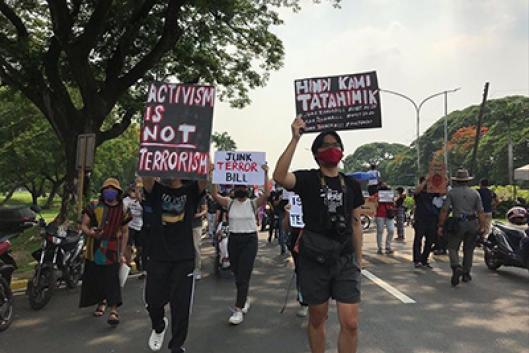Shalmali Guttal, Focus on the Global South
Impacts
Impacts are complex and evident at several levels. In my view, understanding the links between political, economic and social aspects of these emergency measures are especially important in this period. Covid-19 has provided political leaders in many countries a very good “cover” to enact policies that favour their interests, under the pretext of responding to the pandemic. These policies can become institutionalized - emergency measures that are supposed to protect people during exceptional circumstances can easily become a fixture of our lives even after the exceptional circumstances have passed or are under control. Covid-19 is an almost tailor made opportunity for fascist regimes to consolidate their power.
Complete and strictly enforced lockdowns in Asian countries – e.g. India, Philippines, Indonesia—have resulted in severe negative impacts on the livelihoods of forest peoples and forest based communities, who depend on forest eco-systems for their food, medicinal plants, fuel, fiber, and materials for housing and daily use. Although their isolated locations provide them with some protection against the virus, gathering and selling “Minor Forest Produce” (MFP) or Non Timber Forest Products (NTFPs) are crucial (often the sole) sources of income for them. The closures of local markets and restrictions on movement have led to increased cash poverty.
Forest areas have long been sites of conflicts over land and nature’s wealth between communities/populations living in and around these areas on the one hand, and government, military, police and other security forces, and businesses from outside on the other hand. Land-forest grabbing, the logging and extractive industries, poaching and land/territorial conversions for infrastructure projects have not stopped because of COVID-19. Instead, permissions, planning and operations for dams, mining, railways and highways are continuing during this time in Laos, Philippines and India.
The government of Laos, for example, announced yet another dam in the pipeline, even as thousands of families devastated by the collapse of the Xepian Xenamnoi dam in 2018 have still not received any reparations or support for rehabilitation. In the Philippines, conflicts between communities and the OceanaGold Philippines gold and copper mine came to a head in early April, when the central government used the “enhanced community quarantine” (lockdown) as a cover to send police to disband the “peoples’ barricades” that prevented the company from carrying out its operations.
In India, the government has given virtual clearance (because of COVID-19) for national highways and railways to be constructed through national parks and wildlife sanctuaries, even as forest communities are denied their legal tenurial rights in forests. Because of lockdown mobility restrictions, no impact assessments and consultations with people living in and around these areas were conducted. The Ministry of Environment, Forests and Climate Change (MoEFCC) is using the COVID-19 period to open up forests for mining despite growing evidence across the world that shows the increased risks of deforestation to the spread of new pathogens, infections and epidemics. The government is also pushing a new notification for Environmental Impact Assessments (EIAs), which will relax environmental regulations, make it easier for businesses to operate in forest areas, and reduce the opportunities for participation by forest dwelling communities in public hearings on projects that deeply affect their lives and rights.
Many governments in the Asia region are justifying these actions under the pretext of stimulating and restarting economies badly damaged because of the pandemic. Because of the legal restrictions imposed on mobility and public gatherings, and a general suspension of civil liberties and freedoms, people can neither go out to gather information and evidence, nor protest and build resistance to these moves. At the same time, very few governments have increased financing for public health, social protection and security, food programmes and livelihood support. Evictions of local populations, environmental destruction, fragmentation of biodiverse territories and destruction of eco-systems crucial for local food and health, and arrests and incarceration of those who resist, continue unabated despite the pandemic. Forest dwellers and forest dependent communities are particularly disadvantaged and have practically no access to healthcare and adequate support in the face of health and environmental crises.
Strategies for Resistance
We have to keep organising: gather evidence and testimonies from local populations and amplify their voices to the rest of society and the world; and intensify popular education about the links between authoritarian regimes, corporate power and deepening capitalist exploitation of nature and people.
We need to greatly expand and strengthen solidarity based on justice and rights protections: raise resources for legal and material support for all those who stand up in resistance. We are in a struggle against fascism (extreme, right-wing, ultra-nationalist dictatorial powers which violently suppress opposition), statism (when the state has substantial, centralized control over social and economic affairs) and corporatism (significant control over society, economy and politics by corporations), and these are not battles that can be waged effectively without resources and if we are fragmented. Governments and capital see advantages in actively fragmenting nature as well as societies: this makes it easier for them to control, extract value and ‘re-purpose’ nature and people as is convenient for capital—small national parks, smart cities, precarious producers and workers, insecure consumers, etc.
Equally important: we must join hands with progressive communities to build harmonious, democratic, equal, diverse and respectful societies and economies from the ground up. By their very existence and vitality, such societies and economies will challenge exploitative, violent and extractive regimes and systems, and give us hope and strength to continue building resistance.
>>> See here all the Reflections amid the Covid-19 Pandemic from WRM’s Advisory Committee
